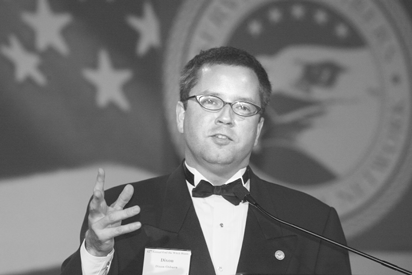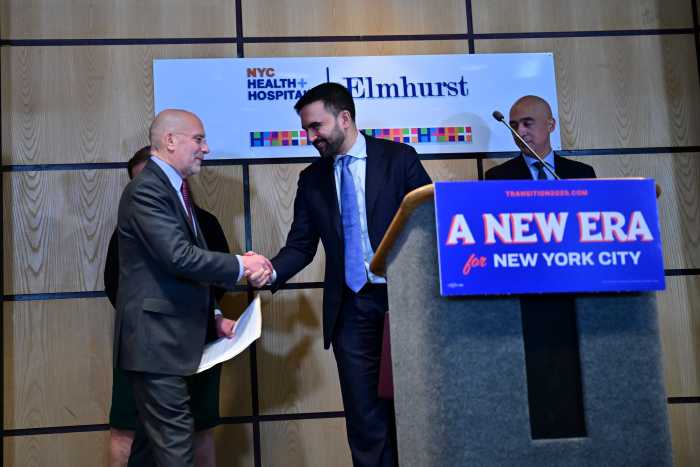Servicemembers Legal Defense Network argues, even with three more Bush years, it’s time
It is a testament to the changing times that those seeking to repeal the U.S. military’s ban on open service by gays and lesbians are saying things couldn’t be much better.
Ever since the election of President George W. Bush, the general perception has been that the LGBT community is on the run, dogged by state marriage amendments, bans on domestic partnerships, the increasingly influential religious right, and a general tenor of unfriendliness emanating from Washington.
There was even the recent U.S. Supreme Court ruling that said universities could not access federal government money if they bar military recruiters from their campuses, even though most schools require that all employers who come to interview their students follow non-discrimination policies that protect sexual orientation. Several law schools had challenged the constitutionality of the Solomon Amendment that more than a decade ago first laid out this restriction, and the Court denied the lawsuit in a unanimous decision.
At first glance, the blow to those fighting the ban seemed grievous. But according to C. Dixon Osburn, executive director of the Servicemembers Legal Defense Network—a Washington-based organization that counsels military personnel who have run afoul of Don’t Ask, Don’t Tell as well lobbying for the ban’s repeal—despite all this things are moving in a decidedly positive direction.
“People are now focused on the underlying issue which is Don’t Ask, Don’t Tell,” he told Gay City News in a recent interview. “If we didn’t have this military ban in place, there would be no concern about military recruiters on campus.”
A slew of editorials in newspapers from the Washington Post to USA Today and The Oregonian called for the ban’s repeal in the days following the Supreme Court’s Solomon decision.
“They all agreed everyone should focus on the farce that is Don’t Ask, Don’t Tell and Congress should step up and repeal this policy,” Osburn said.
As evidence for this forward movement, Osburn pointed to the progress that has been made by the Military Readiness Enhancement Act. Last year, U.S. Representative Marty Meehan, a Massachusetts Democrat, working closely with SLDN, introduced the bill to overturn the military ban. The hope was to have 40 co-sponsors on that legislation by this time. More than one 110 have signed on, including Florida Republican Ileana Ros-Lehtinen, known as a staunch conservative on most other issues. Just this week, retiring New York Republican Congressman Sherwood Boehlert added his name to Meehan’s bill, making him the fifth Republican to do so.
Congressional support is so above expectations that Osburn confidently said, “We think there is a realistic opportunity to get Don’t Ask, Don’t Tell repealed within the next three to five years.”
This is not because the public needs more time to change, according to Osburn—79 percent of Americans already think gays and lesbians should be allowed to serve. Osburn said it will take this long for the political winds in Washington to shift enough for Congress to debate and vote on Meehan’s bill.
“There is piles and piles of data that show Don’t Ask, Don’t Tell is a bad policy. It really is politics, trying to convince those members in Congress who won’t let this move, that it is time to repeal it,” he said, “that compared to 1993, America has changed, the military has changed, and that it would be very easy to change this policy.”
Osburn also noted that a slight majority of new recruits say they are ready, a huge change from the 13 percent of the Armed Forces who said so when the ban was first enacted.
To that end, SLDN has recently entered a new arena—grassroots organizing. SLDN recently hired an organizer to spearhead efforts in the Northeast, not only to get more representatives signed on to Meehan’s bill, but also to convince a Senate Republican to join as an original co-sponsor of a companion measure.
“We want this to be bipartisan,” Osburn said. “If you look at the Senate Republicans who have been supportive on LGBT issues in the past… your natural allies are in Maine and Rhode Island.”
Osborn specifically referred to Maine’s Olympia Snowe and Rhode Island’s Lincoln Chaffee as two Republican senators he hoped would soon join the effort to overturn DADT.
As opposed to their direct lobbying in Washington, Osburn said the grassroots effort would partner with other LGBT groups such as the Log Cabin Republicans and the National Stonewall Democrats, and local organizations such as the Maine Civil Liberties Union and Equality Maine—”ones with deep ties, who know their state and its issues the best,” to lobby senators and representatives from the constituent side.
But is the time right? The ban’s supporters gain great traction by claiming that this kind of “social engineering” is wrong while the country is at war in Iraq, Afghanistan, and more generally against terror around the world. Wouldn’t the major policy change shake an already stressed institution?
“That argument is a red herring,” Osburn said. “So much has changed in the last 13 years. More Americans have gay friend and co-workers. The military has changed. Most young people in the military don’t care. And the military has successfully integrated more out groups than any other institution in America. They would be doing nothing more than what they’ve done in the past.”
A recent study conducted by the Boston Globe bears out Osburn’s contention that the Armed Forces are changing in their attitude toward gay and lesbian personnel.
In 2005, the U.S. military allowed at least 36 soldiers to remain in uniform despite efforts by their colleagues and commanders to remove them for violating Don’t Ask, Don’t Tell. All of these soldiers successfully fought their discharge without denying they are gay.
In 2004, only 22 of 125 cases were successfully contested. The 2005 number of 36 was out of 120 contested cases. And the 2004 number is three times as many as 2003.
A Pentagon spokesperson could not explain the reason for the change.
What has also generally been noted, and Osburn brought this up as well, is the way in which the military responds to questions about the necessity of Don’t Ask, Don’ Tell.
During the ban’s early years, the Defense Department maintained that the policy was necessary for good order and discipline, and that gay soldiers had a deleterious effect on unit performance.
Now, the Defense Department does not defend the policy, but rather notes it is simply following a law enacted by Congress.
Which explains the crux of SLDN’s strategy. The group has a lawsuit pending in federal court to overturn the ban, but much of its energy is focused on swaying legislators, and getting out the word that pressure from constituents can make a difference.
“Common wisdom is that it only takes seven hand-written letters from constituents to get any congressman to pay attention to an issue,” Osburn said. “Everybody needs to know their voice is pretty damn powerful.”
gaycitynews.com


































